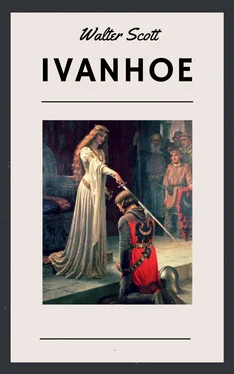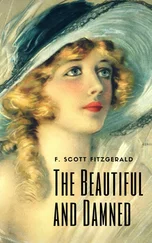Title Page IVANHOE A ROMANCE By Sir Walter Scott Original
INTRODUCTION TO IVANHOE.
DEDICATORY EPISTLE
CHAPTER I
CHAPTER II
CHAPTER III
CHAPTER IV
CHAPTER V
CHAPTER VI
CHAPTER VII
CHAPTER VIII
CHAPTER IX
CHAPTER X
CHAPTER XI
CHAPTER XII
CHAPTER XIII
CHAPTER XIV
CHAPTER XV
CHAPTER XVI
CHAPTER XVII
CHAPTER XVIII
CHAPTER XIX
CHAPTER XX
CHAPTER XXI
CHAPTER XXII
CHAPTER XXIII
CHAPTER XXIV
CHAPTER XXV
CHAPTER XXVI
CHAPTER XXVII
CHAPTER XXVIII
CHAPTER XXIX
CHAPTER XXX
CHAPTER XXXI
CHAPTER XXXII.
CHAPTER XXXIII
CHAPTER XXXIV
CHAPTER XXXV
CHAPTER XXXVI
CHAPTER XXXVII
CHAPTER XXXVIII
CHAPTER XXXIX
CHAPTER XL
CHAPTER XLI
CHAPTER XLII
CHAPTER XLIII
CHAPTER XLIV
NOTE TO CHAPTER I.
NOTE TO CHAPTER II.
NOTE TO CHAPTER XVII.
NOTE TO CHAPTER XXI.
NOTE TO CHAPTER XXII.
NOTE TO CHAPTER XXIX
NOTE TO CHAPTER XXXI
NOTE TO CHAPTER XXXII
NOTE TO CHAPTER XXXIII
NOTE TO CHAPTER XLI.
Imprint
IVANHOE
A ROMANCE
By Sir Walter Scott
Original
The Author of the Waverley Novels had hitherto proceeded in an unabated course of popularity, and might, in his peculiar district of literature, have been termed “L'Enfant Gate” of success. It was plain, however, that frequent publication must finally wear out the public favour, unless some mode could be devised to give an appearance of novelty to subsequent productions. Scottish manners, Scottish dialect, and Scottish characters of note, being those with which the author was most intimately, and familiarly acquainted, were the groundwork upon which he had hitherto relied for giving effect to his narrative. It was, however, obvious, that this kind of interest must in the end occasion a degree of sameness and repetition, if exclusively resorted to, and that the reader was likely at length to adopt the language of Edwin, in Parnell's Tale:
“'Reverse the spell,' he cries, 'And let it fairly now suffice. The gambol has been shown.'”
Nothing can be more dangerous for the fame of a professor of the fine arts, than to permit (if he can possibly prevent it) the character of a mannerist to be attached to him, or that he should be supposed capable of success only in a particular and limited style. The public are, in general, very ready to adopt the opinion, that he who has pleased them in one peculiar mode of composition, is, by means of that very talent, rendered incapable of venturing upon other subjects. The effect of this disinclination, on the part of the public, towards the artificers of their pleasures, when they attempt to enlarge their means of amusing, may be seen in the censures usually passed by vulgar criticism upon actors or artists who venture to change the character of their efforts, that, in so doing, they may enlarge the scale of their art.
There is some justice in this opinion, as there always is in such as attain general currency. It may often happen on the stage, that an actor, by possessing in a preeminent degree the external qualities necessary to give effect to comedy, may be deprived of the right to aspire to tragic excellence; and in painting or literary composition, an artist or poet may be master exclusively of modes of thought, and powers of expression, which confine him to a single course of subjects. But much more frequently the same capacity which carries a man to popularity in one department will obtain for him success in another, and that must be more particularly the case in literary composition, than either in acting or painting, because the adventurer in that department is not impeded in his exertions by any peculiarity of features, or conformation of person, proper for particular parts, or, by any peculiar mechanical habits of using the pencil, limited to a particular class of subjects.
Whether this reasoning be correct or otherwise, the present author felt, that, in confining himself to subjects purely Scottish, he was not only likely to weary out the indulgence of his readers, but also greatly to limit his own power of affording them pleasure. In a highly polished country, where so much genius is monthly employed in catering for public amusement, a fresh topic, such as he had himself had the happiness to light upon, is the untasted spring of the desert;—
“Men bless their stars and call it luxury.”
But when men and horses, cattle, camels, and dromedaries, have poached the spring into mud, it becomes loathsome to those who at first drank of it with rapture; and he who had the merit of discovering it, if he would preserve his reputation with the tribe, must display his talent by a fresh discovery of untasted fountains.
If the author, who finds himself limited to a particular class of subjects, endeavours to sustain his reputation by striving to add a novelty of attraction to themes of the same character which have been formerly successful under his management, there are manifest reasons why, after a certain point, he is likely to fail. If the mine be not wrought out, the strength and capacity of the miner become necessarily exhausted. If he closely imitates the narratives which he has before rendered successful, he is doomed to “wonder that they please no more.” If he struggles to take a different view of the same class of subjects, he speedily discovers that what is obvious, graceful, and natural, has been exhausted; and, in order to obtain the indispensable charm of novelty, he is forced upon caricature, and, to avoid being trite, must become extravagant.
It is not, perhaps, necessary to enumerate so many reasons why the author of the Scottish Novels, as they were then exclusively termed, should be desirous to make an experiment on a subject purely English. It was his purpose, at the same time, to have rendered the experiment as complete as possible, by bringing the intended work before the public as the effort of a new candidate for their favour, in order that no degree of prejudice, whether favourable or the reverse, might attach to it, as a new production of the Author of Waverley; but this intention was afterwards departed from, for reasons to be hereafter mentioned.
The period of the narrative adopted was the reign of Richard I., not only as abounding with characters whose very names were sure to attract general attention, but as affording a striking contrast betwixt the Saxons, by whom the soil was cultivated, and the Normans, who still reigned in it as conquerors, reluctant to mix with the vanquished, or acknowledge themselves of the same stock. The idea of this contrast was taken from the ingenious and unfortunate Logan's tragedy of Runnamede, in which, about the same period of history, the author had seen the Saxon and Norman barons opposed to each other on different sides of the stage. He does not recollect that there was any attempt to contrast the two races in their habits and sentiments; and indeed it was obvious, that history was violated by introducing the Saxons still existing as a high-minded and martial race of nobles.
They did, however, survive as a people, and some of the ancient Saxon families possessed wealth and power, although they were exceptions to the humble condition of the race in general. It seemed to the author, that the existence of the two races in the same country, the vanquished distinguished by their plain, homely, blunt manners, and the free spirit infused by their ancient institutions and laws; the victors, by the high spirit of military fame, personal adventure, and whatever could distinguish them as the Flower of Chivalry, might, intermixed with other characters belonging to the same time and country, interest the reader by the contrast, if the author should not fail on his part.
Читать дальше







